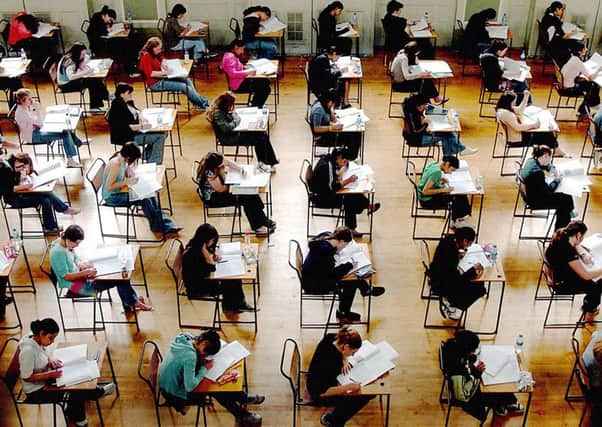Rise of ‘international’ GCSEs in our schools


Hundreds of thousands of teenagers across England, Wales and Northern Ireland are today waking up to their long-awaited GCSE results.
Last year, just over two thirds, 68.8 per cent of entries scored at least a C grade, up 0.7 percentage points on 2013.
Advertisement
Hide AdAdvertisement
Hide AdProf Smithers, director of Buckingham’s Centre for Education and Employment Research, predicted: “Exams regulator Ofqual sets great store by maintaining standards from year to year, so it’s likely that the overall pattern of results will be similar to last year. But because of the movement and changes in the cohort they are likely to be a bit up on last year. I would expect the percentage to be closer to 69 per cent this year.”
A slight rise in top grades is also likely, he suggested.
Prof Smithers claimed that some schools may be moving “weaker” students over to IGCSEs in some subjects and this would have an effect on GCSE results.
Exam reforms introduced in England under the coalition government, such as the decision that only a candidate’s first attempt at a qualification will count in school league tables, will also continue to play a part, he said, as it has led to fewer pupils being entered for exams before the end of Year 11, when students usually sit their GCSEs.
Figures published last week by Cambridge International Examinations (CIE) show that across all subjects, entries for their IGCSE courses in England are up 56 per cent on last year.
Advertisement
Hide AdAdvertisement
Hide AdOver 2,000 UK schools had students taking an IGCSE in English alone, the board said, adding that almost a third of students in England taking an English GCSE-level course this year, took their IGCSE in the subject.
At the same time, data published by Ofqual in May showed a four per cent drop in the numbers of pupils entered for GCSE English this year, compared to last year.
There has been a 51 per cent fall in the numbers of youngsters in Year 10 and below entered for the exam.
“It looks as though schools have been shifting their weaker students to the IGCSE because the IGCSE results have come down quite sharply as the number of entrants has gone up,” Prof Smithers said.
Advertisement
Hide AdAdvertisement
Hide AdCIE’s figures show that this year, 12.4 per cent of IGCSE English entries were awarded an A* or A grade, compared to 15.5 per cent last year, while 63 per cent got at least a C, compared to 64.1 per cent in 2014.
A spokeswoman for CIE said it was difficult to draw conclusions and that standards had been maintained.
Brian Lightman, general secretary of the Association of School and College Leaders said an increase in overall A*-C grades is a possibility, and this could be to do with schools entering pupils later or changes in exam entry patterns.
But he insisted yesterday that any move to IGCSE is about finding the appropriate course for students. “Many schools have entered young people for IGCSEs because they are more appropriate qualifications for those students.
“Some years ago, the coalition praised IGCSEs as being rigorous qualifications.”
Read more...